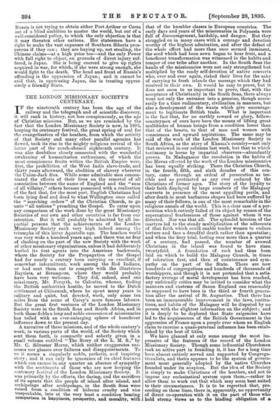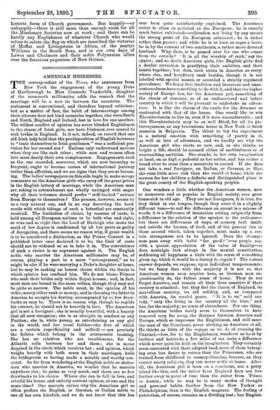THE LONDON MISSIONARY SOCIETY'S CENTENARY.
IF the nineteenth century has been the age of the railway and the telegraph and of scientific discovery, it will rank in history, not less conspicuously, as the age of Christian missions. But, as we are reminded by the fact that the London Missionary Society is now, in 1895, keeping its centenary festival, the great spring of zeal for the evangelisation of the heathen, from which the activity of that Society and many other parallel agencies has flowed, took its rise in the mighty religious revival of the latter part of the much-abused eighteenth century. It was also doubtless closely connected with the wonderful awakening of humanitarian enthusiasm, of which the most conspicuous fruits within the British Empire were, first, the prohibition of the West India slave-trade, and thirty years afterward, the abolition of slavery wherever the Union-Jack flies. While some admirable men concen- trated the efforts of their lives on the removal of all association between the name of England and the "sum of all villainy," others became possessed with a realisation of the fact that, for the most part, English Christians had been lying deaf and dead to what Wellington once called the " marching orders " of the Christian Church, to go unto " all nations " preaching the Gospel. To enter upon any comparison of the work done by the great Missionary Societies of our own and other countries is far from our intention. But it will probably be admitted by all im- partial persons that the achievements of the London Missionary Society rank very high indeed among the triumphs of this latter Apostolic age. The heathen world was very wide a hundred years ago, and there was no fear of clashing on the part of the new Society with the work of other missionary organisations, unless it had deliberately hurled its first agents into the American backwoods, where the Society for the Propagation of the Gospel had for nearly a century been carrying on excellent, if somewhat intermittent, work among the Red Indians, or had sent them out to compete with the illustrious Baptists, at Serampore, where they would probably have been very welcome. They did, indeed, send one missionary, Mr. Forsyth, to Calcutta, whence, finding the British authorities hostile, he moved to the Dutch settlement at Chinsurah, where he spent many years in solitary and quiet, but devoted, work, only some ten miles from the scene of Carey's more famous labours. But the great first ventures of the London Missionary Society were in the South Seas and South Africa, and in both those fields a long and noble succession of missionaries has toiled with an ever-enlarging sphere of beneficent influence down to the present day. A narrative of these missions, and of the whole century's work, in various parts of the world, of the Society which sent them forth, is compactly and soberly given in a small volume entitled " The Story of the L. M. S.," by Mr. C. Silvester Horne, which neither exaggerates suc- cesses nor glosses over failures and disappointments. To us it seems a singularly noble, pathetic, and inspiring story ; and it can only be ignorance of its chief features which can excuse in any quarter an absence of sympathy with the sentiments of those who are now keeping the centenary festival of the London Missionary Society. It was primarily by the efforts, the daring, and the sacrifices of its agents that the people of island after island, and archipelago after archipelago, in the South Seas were raised from a condition of hideous cruelty and vice unspeakable, into at the very least a condition bearing comparison in happiness, prosperity, and morality, With that of the humbler classes in European countries. The early days and years of the missionaries in Polynesia were full of discouragement, hardship, and danger. But they struggled on in many cases with a courage and devotion worthy of the highest admiration, and after the defeat of the whole effort had more than once seemed imminent, the seed which had been sown began to bear fruit, and a beneficent transformation was witnessed in the habits and temper of one tribe after another. In the South Seas the hands of the missionaries were not only strengthened but multiplied by the ready self-devotion of native converts who, over and over again, risked their lives for the sake of carrying to fresh islands the message which they had received in their own. It would be easy to prove, but it does not seem to us important to prove, that, with the acceptance of Christianity in the South Seas, there always went not only the entrance into a genuine, though neces- sarily for a time rudimentary, civilisation in manners, but also a development of the wants which give encourage- ment to legitimate British trade. What is important is the fact that, for no earthly reward or glory, fellow- countrymen of ours have been the means of lifting great multitudes of human beings from a condition lower than that of the beasts, to that of men and women with consciences and upward aspirations. The same may be said of the work of the London Missionary Society in South Africa, as the story of Khama's country—not only that reviewed in our columns last week, but that to which testimony is borne by impartial observers—abundantly proves. In Madagascar the revolution in the habits of the Hovas effected by the work of the London missionaries has been equally striking. There the Christian Church, in the fourth, fifth, and sixth decades of this cen- tury, came through an ordeal of persecution as ter- rible and as protracted as any ever endured by the Christians of former ages. The story of the loyalty to their faith displayed by large numbers of the Malagasy converts in presence of the most appalling perils, and after death in most barbarous shapes had been suffered by many of their fellows, is one of the most remarkable in the religious annals of the world. This is a clear case of a per- secution which entirely failed of its object by reason of the supernatural fearlessness of those against whom it was directed. Nor was that all. The splendid heroism of the martyrs led to the steady multiplication of the adherents of that faith which could enable tender women to endure torture and face a dreadful death rather than apostatise ; and when the fiery trial, lasting over more than a quarter of a century, had passed, the number of avowed Christians in the island was found to have risen twentyfold. A foundation of rock had thus been laid on which to build the Malagasy Church, in times of toleration first, and then of countenance and sym- pathy on the part of the State. There are now hundreds of congregations and hundreds of thousands of worshippers, and though it is not pretended that a, satis- factory average of moral development has been reached, any unfriendly critics may be invited to consider what the manners and customs of Saxon England can reasonably be supposed to have been in the third or fourth genera- tion after the arrival of St. Augustine. That there has been an immeasurable improvement in the laws, institu- tions, and habits of the Malagasy will be disputed by no person with the slightest information on the subject ; and it is deeply to be deplored that State exigencies have led to the acquiescence of the British Government in the aggression of France upon a people over whom an English claim to exercise a quasi-paternal influence has been estab- lished by the beat of titles. We have glanced at only some among the most im- pressive of the features of the record of the London Missionary Society. Though some influential Churchmen took an active part in founding it, it has for a long time been almost entirely served and supported by Congrega. tionalists, and theirs appears to be the system of govern- ment most generally adopted by the native Churches founded under its auspices. But the idea of the Society is simply to make Christians of the heathen, and not to impose any ecclesiastical system upon them,—rather to allow them to work out that which may seem best suited to their circumstances. It is to be regretted that, pro- ceeding on these lines, there is, apparently, no opportunity of direct co-operation with it on the part of those who hold. strong views as to the binding obligation of a
historic form of Church government. But happily—or unhappily—there is still more than enough room for all the Missionary Societies now at work ; and there can be hardly any Englishmen of whatever Church who would refuse to salute the flag on which are inscribed the victories of Moffat and Livingstone in Africa, of the martyr Williams in the South Seas, and in our own days of Lawes and Chalmers and their noble Polynesian allies over the ferocious paganism of New Guinea.







































 Previous page
Previous page